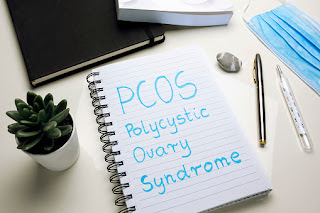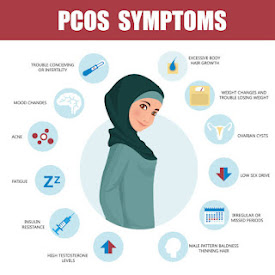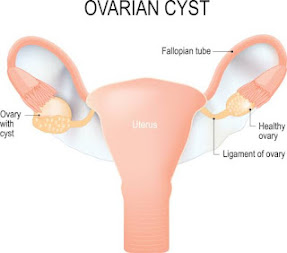PCOs (Polycystic ovary syndrome)
PCOs (Polycystic ovary syndrome) is a disease that mostly affects women. PCOs is most common in women who are at their reproductive age. A woman with the problem of PCOs faces an irregularity in their menstrual cycle. That woman would also have an excess level of male hormone which is an androgen. In Polycystic ovary syndrome ovaries develop several small cysts called follicles and after that ovaries fail to release eggs as regular. There is a lot of research done on Polycystic Ovary Syndrome but the exact cause of this syndrome is still unknown. This syndrome can also lead to complications that may be long terms like Type-2 Diabetes and heart disease but the early diagnosis and treatment along with weight loss can reduce the risk of such complications.
Signs and symptoms of PCOs ( Polycystic Ovary Syndrome):
Polycystic ovary syndrome can develop in early menstruation mostly their symptoms are developed during the first menstrual period but sometimes PCOs may develop later and their symptoms are going to appear in the form of weight gain. Its signs are more common in overweight women.
- Irregular or abnormal menstrual periods are the most common symptom of PCOs. A woman with this problem faces heavy periods and has more than 35 days between periods and has periods less than 9 times a year.
- Having androgen (the male hormone) in excess amounts also results in Polycystic Ovary Syndrome, such as developing males secondary characteristics like long hair on the face and body, having severe acne and baldness like men.
- The swelling of ovaries and having follicles around the eggs is also a symptom of polycystic ovary. In this condition, the ovaries may fail to function normally.
Causes of PCOs (polycystic ovary syndrome):
Genetics:
One of its main cause is Genetics. However, a single gene that causes this syndrome is not still found so we can say that multiple genes are involved in causing this ovary syndrome. The other family members of a woman with this problem also have chances to develop PCOs. Also, women with disease of polycystic ovary have a higher risk of developing Type-2 Diabetes.
Irregularity In hormone levels:
It is also the main cause of developing this problem. These hormones are insulin and androgen (male hormone) which are involved in causing PCOs. The role of Insulin is to keep the level of sugar low in the blood after eating.
Insulin resistance:
Insulin resistance is also a cause of Polycystic Ovary Syndrome. It is estimated that about 85% of women with this syndrome have insulin resistance in their bodies. If our body has insulin resistance then our body’s cells stop their insulin response and it does not keep the sugar level of blood normal after eating as it blocks the entry of glucose into the cells and blood sugar level keeps on rising in the blood which causes Type-2 Diabetes.
Androgen:
Androgen is also called male hormone and is present In both men and women but it is present in higher amounts in men than in women. In the body tissues of the ovaries and adrenal glands, all women have a small amount of androgen. When this androgen is increased in the body than its normal amount it causes PCOs in women. It shows symptoms like increased hair growth on the face and body, and severe acne.
Weight and lifestyle of a person with PCOs:
life style and weight also cause PCOs. The overweight and slender women both have the chances of having PCOs but the overweight women have a higher risk of PCOs. Eating too much germ food is also a cause of having PCOs. However, a healthy lifestyle of nutritious food recommended by your dietitian and healthy physical activity can help to treat PCOs.






